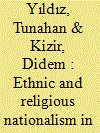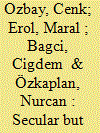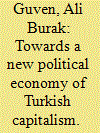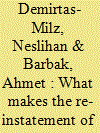|
|
|
Sort Order |
|
|
|
Items / Page
|
|
|
|
|
|
|
| Srl | Item |
| 1 |
ID:
190682


|
|
|
|
|
| Summary/Abstract |
This study investigates the peace process between the Turkish government and the PKK, invoking the mutually hurting stalemate (MHS) and mutually enticing opportunity (MEO) formulations of Ripeness Theory. It questions why the negotiations failed although Turkey’s conditions had become ripe for resolution. This research shows that even though the ripe moment occurred before the process steered the parties toward the negotiation table, their perspectives regarding the table ultimately changed due to both domestic and international developments. Hence, the MHS seized at the beginning of the process did not turn into the MEO that would lead to resolution.
|
|
|
|
|
|
|
|
|
|
|
|
|
|
|
|
| 2 |
ID:
190685


|
|
|
|
|
| Summary/Abstract |
This article compares the ideas of Hüseyin Nihal Atsız and Seyyid Ahmet Arvasi, two iconic ideologues of ethnic and religious nationalism in Turkey, respectively, on the issues of history, identity, and national ideal. It first argues that Atsız mainly presents a history of Turkish supremacism whereas Arvasi embraces a method of Islamization to remember history. It also demonstrates that Atsız tends to equate the racial and the national while Arvasi uses Islamic legitimacy for Turkish identity and nationalism. It is also evident that while Atsız offers classical pan-nationalism, Arvasi shows third-worldist and universalistic tendencies in defining Turkish destiny.
|
|
|
|
|
|
|
|
|
|
|
|
|
|
|
|
| 3 |
ID:
190684


|
|
|
|
|
| Summary/Abstract |
In the last several years, the AKP government in Turkey has granted exceptional citizenship to more than 200,000 Syrian refugees and 19,000 foreign investors, mostly from the Middle East. This study defines the AKP’s recent policy of granting exceptional citizenship as an illiberal inclusion, which is a mode of neoliberal and particularistic inclusion without extending the eligibility and rights of regular migrants and refugees. By means of exceptional citizenship, the AKP transforms the politics of granting particularistic access to Turkish citizenship, from one characterized by an ethno-religious inclusion towards another defined by more explicit religious inclusion entangled with its neo-Ottomanist domestic and foreign policy goals. The study also suggests that the current state of granting exceptional citizenship is intermingled with the AKP’s authoritarian neoliberalism, and the structural centralization of executive power under the current presidential system.
|
|
|
|
|
|
|
|
|
|
|
|
|
|
|
|
| 4 |
ID:
190687


|
|
|
|
|
| Summary/Abstract |
This article examines 64 autobiographical narratives written by erstwhile political prisoners who were forced to cohabitate with their adversaries in post-1980 coup military prisons of Turkey in the mixing-for-peace (karıştır-barıştır) program. Tracing these narratives published between 1988 and 2019, it argues that there are three recurrent versions of remembering the enemy: ‘the unjust’ is utilized in the identity reformulation of right-wing Ülkücü militants whereas ‘the miserable fascist’ reaffirmed the leftists’ superior self-image vis-à-vis the right-wingers. While these two are predominantly entrenched in far-right and far-left memory camps, remembering the enemy as ‘the fellow victim’ provides a case of multidirectional memory as it was expressed by both left-wing and right-wing political figures to narrativize their break from radicalism and to whitewash their responsibility in the past violence. This tripartite division in remembering the enemy suggests the addition of a radical/centrist axis to the conventional left/right axis for a more comprehensive understanding of post-coup memory in Turkey.
|
|
|
|
|
|
|
|
|
|
|
|
|
|
|
|
| 5 |
ID:
190688


|
|
|
|
|
| Summary/Abstract |
This study addresses economic issues associated with the private defined benefit pension system in Turkey. Findings show that the new Turkish pension scheme has generated significant welfare improvements for individual investors, but at a loss in tax revenue and an economic resource cost to the country. If the bank-administered Tax-Free Contribution Accounts and/or Tax-Free Savings Accounts, similar to those operating in Canada, were adopted in Turkey and the requirement of holding government securities was lifted, such schemes would provide contributors with benefits similar to what they currently enjoy under the new Turkish scheme, while eliminating the economic resource costs of administration and improving their net fiscal impact.
|
|
|
|
|
|
|
|
|
|
|
|
|
|
|
|
| 6 |
ID:
190683


|
|
|
|
|
| Summary/Abstract |
This article contributes to studies on youth in Turkey by exploring gender, sexuality, intimacy, and relationship practices among college students. Our findings show that there is change (a) towards greater gender equality; (b) about attitudes regarding family, sexuality, and romance; and (c) in understanding and experiencing gendered violence in the groups of students we examined. Progressive values appear to become more common among the participants despite the increasingly conservative tone of the political and cultural climate. However, traditional relationship patterns and norms, including the idealization of monogamous relationships, robust familial ties, and sensitivity for moral reputation, seem prevalent even though these were not associated with the ascendant politico-religious conservatism. By constituting ‘secular but conservative’ intimate selves and relations, our respondents approve the freedom and right to explore possibilities for others, and yet not immediately for themselves, as they preserve an unequivocal moral self.
|
|
|
|
|
|
|
|
|
|
|
|
|
|
|
|
| 7 |
ID:
190689


|
|
|
|
|
| Summary/Abstract |
Political economists investigating Turkey's turbulent path in recent years predominantly work from within three different characterizations of Turkish capitalism: authoritarian neoliberalism, crony capitalism, and state capitalism. This article critically reviews these competing visions and identifies directions for future research. I argue that, fundamental differences aside, these approaches together illustrate the indispensability of a political economy perspective for comprehending Turkey’s current predicament, in particular its authoritarian turn and ongoing systemic crisis. Yet meeting the potential of this research program also requires resisting rigid macro conceptualizations and aiming instead for empirically rich analyses of nuts-and-bolts phenomena such as changes in the class map, sectoral regimes, and challenges of development, with a view to identifying feasible strategies of renewal post-AKP.
|
|
|
|
|
|
|
|
|
|
|
|
|
|
|
|
| 8 |
ID:
190686


|
|
|
|
|
| Summary/Abstract |
Turkey’s institution of night watchmanship, or bekçilik, almost vanished during the 1990s as new recruitment was halted. Since 2016, however, the ruling Justice and Development Party (AKP) has renewed recruitment in line with its agenda of revitalizing the institution, with recruits now officially named Market and Neighborhood Watchmen. The new regulatory and administrative context is highly centralized while their duties are scarcely different from those of the regular police forces, giving the institution’s longstanding ambiguity or in-betweenness a more complicated form. In its attempt to publicly legitimize the institution, the AKP has relied on myth creation. Accordingly, this article contextualizes this process of double myth creation at the intersection of Turkey’s neoliberal security sector reforms and AKP’s securitization policies. In doing so, the article reveals the reasons underlying growing public anxiety regarding the institution.
|
|
|
|
|
|
|
|
|
|
|
|
|
|
|
|
|
|
|
|
|